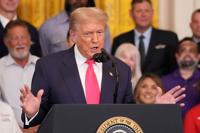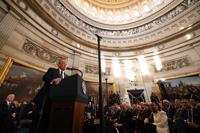Hong Kong (CNN) — China on Friday signaled it would approve the export of rare earth minerals to the US, hours after White House officials said the two sides had reached a deal, in what would be a major breakthrough following weeks of negotiations over US access to the key materials.
Rare earths – essential in everything from everyday electronics to fighter jets – had become a key focus of trade frictions between the world’s two largest economies in recent weeks as their tit-for-tat tariff escalation morphed into a supply chain struggle.
“China will approve the export application of controlled items that meet the conditions in accordance with the law. The United States will cancel a series of restrictive measures taken against China accordingly,” China’s Ministry of Commerce said in a statement.
The statement was framed as a response to a question that specifically referenced how “China will accelerate the export of rare earths to the United States.”
The Chinese statement followed comments from US President Donald Trump and his Commerce Secretary Howard Lutnick Thursday confirming that the two sides had reached a deal.
The agreement appears to formalize an understanding reached between the two sides earlier this month in London, which the US at the time said needed to be approved by Trump and Chinese leader Xi Jinping.
On Thursday, US Commerce Secretary Howard Lutnick was quoted by Bloomberg News as saying that China is “going to deliver rare earths to us” and once they do that, “we’ll take down our countermeasures,” referring to the US imposed on China in May as US officials accused Beijing of not honoring a deal reached that month in Geneva, by holding up rare earth exports.
At a White House event on Thursday Trump said: “we just signed with China yesterday,” without elaborating.
In its statement Friday, China’s Commerce Ministry said it hoped that the two sides could “continuously enhance consensus, reduce misunderstandings, strengthen cooperation, and jointly promote the healthy, stable and sustainable development of China-US economic and trade relations.”
Rare earths in focus
China controls around 90% of global rare earth processing, according to the International Energy Agency.
The two countries last month in Geneva to de-escalate hefty tariffs that had resulted in a de-facto trade embargo, but that agreement quickly fell apart due to the Trump administration’s frustrations that China was not lifting export controls on rare earths that it had imposed following Trump’s so-called reciprocal tariffs placed on China in April.
The US, in retaliation, imposed export curbs on chips software, ethane and jet engines, while threatening to revoke the US visas of Chinese students. China said it was complying with the agreement and blamed Washington for reneging on its promises.
Officials from both sides then returned to the negotiating table in London in June.
Following those talks, Trump had been reached, pending approval from both national leaders, and that both sides had agreed to ease export restrictions. The US will also allow Chinese college students to attend American universities, Trump suggested.
“Magnets and any necessary rare earths will be supplied up front by China,” he wrote on social media at the time.
Reuters reported this week that the US Commerce Department has allowed ethane traders to load ethane on vessels bound for China. But it has prohibited them from unloading in China without authorization – signs experts interpret as the administration is preparing to lift the curbs.
Under the dual use licensing regime China introduced for rare earths in April, exporters are required to seek approvals for each shipment to customers in any country and submit documentation to verify the intended end use of these materials.
While China has in recent weeks repeatedly said that it has been “speeding up” approvals of rare earth export licenses for “compliant” applications, experts and industry insiders have told CNN that many companies are still struggling to secure sufficient supplies of these critical elements and magnets.
Analysts also expect China’s dual use export restrictions still prohibit shipments to military suppliers, leaving US defense contractors without access to such materials.
The-CNN-Wire
™ & © 2025 Cable News Network, Inc., a Warner Bros. Discovery Company. All rights reserved.














